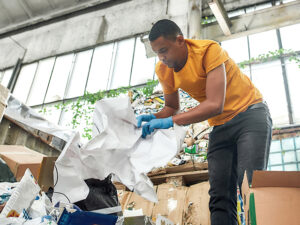
In an era marked by environmental challenges, students at Florida A&M University strive to expand their knowledge on the importance of climate change and the significance of environmental sustainability. FAMU’s School of the Environment takes on the initiative to engage its students academically and hands-on, leading the future of advocates for environmental change in a world grappling with the effects of climate change.
Associate Professor Richard Gragg details the extensive initiative and opportunities that are provided at FAMU, as well as expressing how important it is to combine the community and resources readily available to continue to achieve environmental sustainability goals and raising awareness on climate change.
“From my perspective, the myriad teaching, research and service activities and practices across our environmental science and environmental studies programs and center facilities have frequent coverage of climate change in the FAMU School of the Environment,” Gragg said. “All students, faculty and staff across the curriculum must imperatively garner the appropriate and relevant knowledge, awareness, and skills pertinent to meeting the challenges and opportunities of climate change.”
“This would entail collaborative inter-and-intra generational approaches and commitments to rethink and address FAMU’s role in advancing transformational teaching, research and service methods and practices responsive to climate changing human-environment interactions,” Gragg added.
At FAMU, students who are interested in pursuing environmental studies are exposed to a rather comprehensive curriculum that goes beyond a traditional classroom. Students have the choice to engage in clubs and organizations, weekly seminars and a variety of student- and faculty-led projects to raise awareness and community-based engagements. The Sustainability Institute hosts the FAMU Environmental Sustainability Club with 200 active members.
Autumn Dancy, a fourth-year double major in environmental studies and broadcast journalism, serves as president of FAMU’s Sustainability Club and believes that she has an obligation to use her knowledge and love for the Earth to serve it the way that it serves us.
“Our mission in the Sustainability Club is to create a sustainable FAMU, and we have done that with service that includes litter cleanups, animal shelter supply drive, garden maintenance, student engagement events, as well as improving campus protocol to help FAMU become more sustainable. “Not a month goes by that we don’t have a few initiatives and enjoyable activities going on for students to have a true positive and hands on impact,” Dancy said. “Climate change is a large topic in the School of the Environment curriculum studying from a data and research standpoint, and its scientifically undeniable that the correlation between increased CO2 levels in the atmosphere since the industrial revolution have a relationship with these never-before-seen changes of the global climate and increased frequency of storms. We encourage everyone to minimize their use of one-use plastics and papers, consumption of meat and dairy, and try to consume environmentally conscious products. It sounds silly, but each small individual difference does make difference,” Dancy said.
FAMU also provides students with opportunities to attend conferences and workshops that address renewable energy sources, food security, climate concerns and sustainability. Programs in environmental science and environmental studies also have close proximity resources that contribute to conducting research on the ecosystem and continue to open the doors to environmental careers.
Destiny Coleman, a fourth-year environmental science major, provides information on more student environmental involvement and how important environmental sustainability is.
“To me, the environment must be a priority, it’s the only home we have and it provides resources for all living organisms,” she said. “The Environmental Sustainability club at FAMU is always shedding light on topics such as recycling, sustainable fashion and valuing the Earth’s resources.”
“The Sustainability Club often works with the FAMU thrift club and the College of Agriculture and Food Sciences to host events that empower and educate the community,” Coleman added.
In addition to educating students on the significance of climate change, the FAMU School of the Environment also empowers students to become agents of change in a world that is in need of innovative solutions.